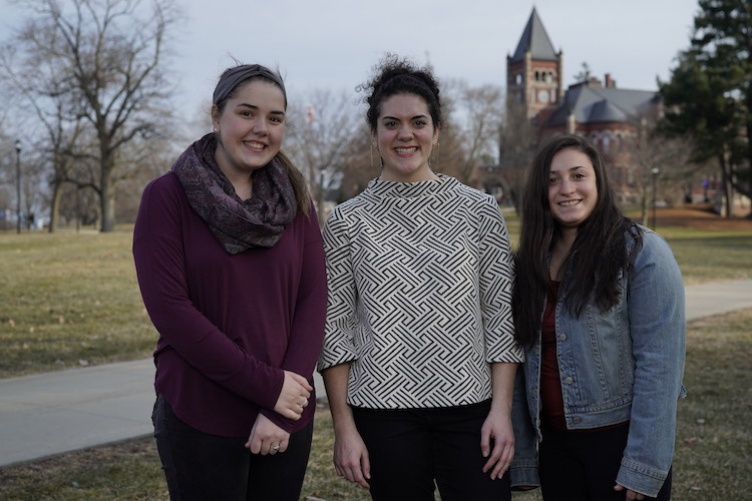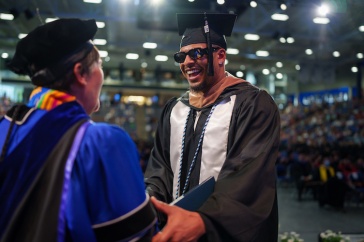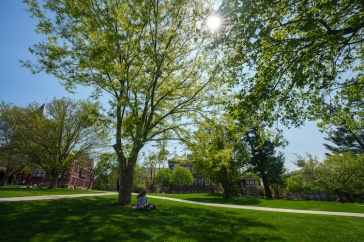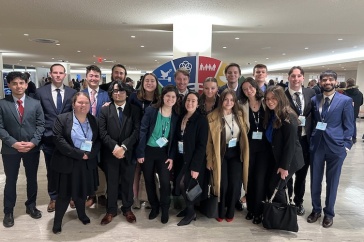
(L to R) Colleen Parisi ’20, Laura Howard ’20, Alexia Gianoulis ‘21
Colleen Parisi ’20 opens her backpack and pulls out a manila folder to demonstrate what she and her fellow student mentors at the Center for Academic Resources (CFAR) call the “to-do folder.”
All you need to do is draw a column for each day of the week and grab a stack of small sticky notes for your tasks, and voila — you have a transportable visual of what you need to accomplish that week.
As a psychology major and four-year student mentor at CFAR, it’s the kind of tool Parisi uses with her mentees, many of whom come in for guidance on time management. It’s also one she happens to use for herself. That’s how CFAR works: building essential learning skills, student to student, one student at a time.
“We’re not a big, scary adult saying, ‘this is what you need to do.’ We’re saying, ‘let’s work together.’”
The center has provided academic support on campus for some 40 years, ever since its director Daniela Adler created it – while still a senior at UNH. The driving force behind the establishment of CFAR was to build on the university’s long-term participation in the federal TRIO program, which helps low-income and first-generation students succeed in college. Adler built out a framework and program that made those critical academic supports accessible to all students on campus who needed them.
Today, the student academic mentors at CFAR are at the forefront of a universitywide push to better connect struggling students to key supports that can help get them back on track.
Adler says that UNH President James Dean’s focus on retention and student outcomes has helped to put “CFAR on the map,” boosting both resources and awareness. During the 2018-2019 academic year, CFAR saw a significant 33% increase in the number of students they reached.
Some of those students arrive in crisis mode — say, days before a final they need to ace to pass a class — but some are simply looking for accountability. The center’s approach, its student mentors will tell you, is about learning how to learn.
CFAR mentors focus on things that can seem fundamental — how to take notes or decipher a syllabus — because they are. Without them, students can get lost at college. But the right intervention at the right time? It can be a game changer, the difference between a student succeeding and slipping.
“You can do flashcards for days, but if you’re studying for an applications test, you’re sunk,” Adler says.
Those shifts in foundational habits can make it possible for students to learn and ultimately succeed. “That’s the lightbulb moment,” says Alexia Gianoulis, a pre-vet junior and student mentor.
Though the center’s professional staff includes education scholars at the forefront of their fields, the peer mentorship model is essential to CFAR’s impact; it’s about the power of the right voice.
“From the start, the vision has always been that one-on-one relationship,” says Adler.
Laura Howard, a senior nursing major who is also a four-year CFAR student mentor, says that those connections can help struggling students tap into their motivation.
“We’re not a big, scary adult saying, ‘this is what you need to do.’ We’re saying, ‘let’s work together,’” Howard explains.
However, the other side of the coin is just that: the mentors are also students. As their mentees face an increasing number of non-academic challenges, it can be a lot of weight for the students to shoulder as they navigate their own complex college careers. Howard, for instance, is completing a senior nursing intensive in Littleton, New Hampton, while also taking classes on campus. Gianoulis will soon be applying to vet school on top of her already rigorous academic program.
Critical to their own resilience and their capacity to navigate difficult scenarios is their ongoing support from Adler — and the community they build mentor-to-mentor.
The bottom line, Howard says, is helping students shift their mindset around academic success from pleasing others to, “No, I actually want to do this.”
She adds, “Let’s help them find their UNH.”
-
Written By:
Ali Goldstein | UNH Marketing



















































